2007 年江苏成人学士学位英语考试真题及答案
ENGLISH QUALIFICATION TEST FOR A BACHELOR’S DEGREE Nov. 2007
Paper One
Part I Listening Comprehension (15 minutes, 15%)
Section A (10%)
Directions: In this section you will hear ten short conversations. At the end
of each conversation a question will be asked about what was said. Both the
conversation and the question will be spoken only once. After each question there
will be a pause. During the pause you must read the four choices marked A, B, C and
D, and decide which is the best answer. Then mark the corresponding letter on the
Answer Sheet with a single line through the center.
1. A. En the cafeteria. B. In the library.
C. In the dormitory. D. In the classroom building.
2.A.5:00. B.5:15. C. 5:30. D. 5:45.
3. A. Skating. B. Swimming.
C. Boating and swimming D. Boating and skating.
4. A. An engineer. B. A driver. C. A librarian. D. A typist.
5. A. His article has been changed B. He is very glad to hear the woman.
C. He is proud of his article. D. He can’t believe the woman.
6. A. A toy bear is not lovely at all.
B. A toy bear is just what she needs.
C. She should have bought more toy bears.
D. She shouldn’t buy the toy bear.
7. A. A sweater. B. A blouse. C. A coat. D. A skirt.
8. A. It’s easy to make friends.
B. It’s difficult to make friends.
C. To make friends one has to be quite frank.
D. To make friends one has to be friendly.
9. A. He doesn’t’ like it. B. He’s indifferent to it.
C. He enjoys it. D. He cares about all the overtime.
10. A. They are having breakfast. B. They are eating some fruits.
C. They are preparing a hot soup. D. They are drinking cold milk.
Section B (5%)
Directions: In this section, you will hear one dialogue and one short passage.
Ar the end of the dialogue and the passage, you will hear some questions. The dialogue
and passage as well as the questions will be spoken only once. After you hear a
question, you must choose the best answer from the four choices marked A, B, C and
D. Then mark the corresponding letter on the Answer Sheet with a single line through
the center.
Questions 11-12 are based on the following dialogue.
11. A. Two. B. Three. C. Four. D. Five.
12. A. Because she worked for a long time yesterday.
�
B. Because she went shopping yesterday.
C. Because the twins were sick all night.
D. Because she has just finished a long journey.
Question 13-15 are based on the following passage.
13. A. Alcohol helps develop people’s intelligence.
B. Heavy drinking is not necessarily harmful to one’s health.
C. Controlled drinking helps people keep their wits as they age.
D. Drinking, even moderately, may harm one’s health.
14. A. Worried. 13. Pleased. C. Surprised. 0. Unconcerned.
15. A. At a conference. B. On television. C. In a newspaper. D. In a journal.
Part II Reading Comprehension (30 minutes, 30%)
Directions: In this part there are four reading passages. Each passage is
followed by some questions or incomplete statements. For each of them there are four
choices marked A, B, C and D. You are required to choose the best answer from the
four choices. Then mark the corresponding letter on the Answer Sheet with a single
line through the center
Questions 16-20 are based on the following passage.
I heard many parents complaining that their teen-age children are rebelling.
I wish it were so. At your age you ought to be growing away from your parents. You
should be learning to stand on your own two feet. But take a good look at the present
rebellion. It seems that teen-agers are taking the same way of showing that they
disagree with their parents. (86) Instead of striking out boldly on their own, most
of them are clutching at one another’s hands for reassurance.
They claim they want to dress as they please. But they all wear the same clothes.
They set off in new directions in music. But somehow they all end up huddled round
listening to the same record. Their reason for thinking or acting in thus-and-such
a way is that the crowd is doing it. They have come out of their cocoons (茧) and
entered a larger one.
(87) It has become harder and harder for a teen-ager to stand up against the
popularity wave and to go his or her own way. Industry has firmly carved out a teen-age
market. These days every teen-ager can learn from the advertisements what a teen-ager
should have and be. And many of today’s parents have come to award high marks for
the popularity of their children. All this adds up to a great barrier for the
teen-ager who wants to find his or her own path.
But the barrier is worth climbing over. The path is worth following. You may
want to listen to classical music instead of going to a party. You may want to collect
rocks when everyone else is collecting records. You may have some thoughts that you
don’t care to share at once with your classmates. Well, go to it. Find yourself.
Be yourself. Popularity will come with the only kind of popularity that really counts.
16. In the passage, the author wants to tell ________
A. readers how to be popular with people around
B. people how to understand and respect each other
C. parents how to control and guide their children
D. teen-agers how to learn to decide things for themselves
�
17. According to the author, many teen-agers think they are brave enough to act
on their own, but, in
fact, most of them ______.
A. are too young to do so
B. are much afraid of getting lost
C. dare not cope with problems single-handed
D. have much difficulty understanding each other
18. Which of the following is NOT true?
A. There is no popularity that really counts.
B. It is not necessarily bad for a teen-ager to disagree with his or her
classmates.
C. What many parents are doing is in fact hindering their children from finding
their own paths.
D. Most teen-agers claim that they want to do what they like to, but they are
actually doing the
same.
19. What does the author think of advertisement?
A. Convincing. B. Influential. C. Instructive. D. Authoritative.
20. During the teen-age years, one should learn to ________
A. find one’s real self
B. get into the right reason and become popular
C. differ from others in as many ways as possible
D. rebel against parents and the popularity wave
Questions 21-25 are based on the following passage.
In order to learn a foreign language well, it is necessary to overcome the fear
of making mistakes. If the primary goal of language use is communication, the
mistakes are secondary consideration that may be dealt with gradually as awareness
of those mistakes increases. On the other hand, students should not ignore their
mistakes. (88) The language learner may observe how native speakers express
themselves, and how native expressions differ from the way the learner might say
them. For example, a Spanish speaker who has been saying “1 do it” to express
willingness to do something in the immediate future, could, by interacting with
native speakers of English, observe that native speakers actually say “I’ ll do
it”. The resulting discrepancy can serve as a basis for the student to modify his
way of using the present tense in English. But a student who is unwilling to interact
in the first place would lose this opportunity to learn by trial and error.
21. According to the passage, foreign language students should not worry too
much
about making mistakes because ________
A. native speakers will ignore their mistakes
B. communication is the primary goal of language learning
C. native speakers like foreign students who try to learn their language
D. everyone makes mistakes when trying to communicate in a strange language
22. The passage indicates that the present tense in English is _________
�
A. basically the same in English as it is in Spanish
B. not the most difficult problem for foreign students
C. not used to express a desire to do something in the immediate future
D. used with some verbs but not with others to express future intention
23. The author thinks that language learners can reduce the number of their
mistakes by _____
A. asking native speakers for explanations
B. reading good books in the foreign language
C. speaking without regard to native speakers
D. comparing their speech with that of native speakers
24. The passage implies that foreign students who do not interact with native
speakers will not _ __.
A. have to worry about making mistakes
B. learn very much about the foreign culture
C. learn about the history of the foreign language
D. take advantage of available language models
25. The author's major conclusion about the function of mistakes in foreign
language learning is that .
A. mistakes do not interfere with communication
B. learners are often very afraid of making mistakes
C. mistakes are not important in the process of learning a language
D. making mistakes can help the learner discover the rules of the language
Questions 26-30 are based on the following passage
During a state of deep relaxation, several physiological changes take place in
the body: the body’s oxygen consumption is reduced; the heart beat decreases; muscle
tension and sweating ease, and there is decreased sympathetic (交感的) nervous
system activity. This restful state not only allows the body to repair and restore
itself, but it has a calming effect on the consciousness.
How to achieve this state of relaxation, however, is a matter of opinion, and
in some medical circles, a matter of controversy. A recent report by Dr. David Holmes
of the University of Kansas in the journal “American psychologist” said that simple
sitting in an armchair has just as many beneficial characteristics for the body as
meditation () does. Researchers of other relaxation techniques disagree. These
experts believe that more structured techniques, such as meditation, lead to a
condition of deep relaxation.
(89) The debate goes on. but one thins appears to be clear: the relaxation
response can be reached by a number of methods, and the methods themselves are not
as important as getting there. One day, one method may work best; on another day,
an alternative method may be more appropriate. Once you are aware of all the methods,
you can find the one that works best for you.
Some of the relaxation techniques are meditation, autoanalysis (自我心理分析)
and progressive muscle relaxation response than just sitting quietly in a chair,
they have the added benefit of structure and discipline, and for these reasons appear
to be more effective for most individuals.
�
26. The passage indicates that a state of deep relaxation is not only good for
one’s body, but also
beneficial to ________
A. heart beat
B. consciousness
C. muscle tension
D. sympathetic nervous system
27. People seem to agree that ________
A. sitting in an armchair benefits a person as meditation does
B. what people are struggling for is a state of deep relaxation
C. to achieve a state of deep relaxation is possible through various means
D. structured consciousness relaxation techniques are more beneficial for a
person
28. In the third paragraph, the phrase ?°getting there?± most probably means
A. arriving at one’s destination
B. getting what one wants most
C. reaching a state of deep relaxation
D. finding out a suitable relaxation technique
29. As far as relaxation is concerned, the author indicates that ?a_____
A. aims are more important than means
B. means are more important than aims
C. some relaxation techniques are better than others
D. more and more people are interested in relaxation techniques
30. The author’s attitude toward relaxation is best described as
A. critical B. objective C. optimistic D. subjective
Questions 31-35 are based on the following passage.
I am not a computer expert. 1 never learned much in the way of math. And I am
quite puzzled by things like engineering or electronics.
Then why am I able to write about computers? I can write on this subject because
of these shortcomings. The last two years of learning has been a severe test for
me. By hard work I have managed to learn enough to use computers fairly well, and
to work with people who know a great deal more than I. Since I have learned all this
at such personal cost, I would like to share my knowledge with others.
The best way to learn is to take a course. However, many people do not have the
time for this. They will have to find some other way to get basic information. I
hope to be able to help them by writing about some of the things I have learned myself.
I have a home computer on which I have learned in my own time. I have used it
like a home study course. I have sat down with it day after day, night after night,
I have forced it to give up some of its secrets. Now I can use it to do some of the
work that I get paid for. And I can do this work in my own home, instead of in an
office. Many people may soon be working on a computer at home, just as many now take
in other people’s typing.
Some things about computers are easier than you may fear. First, computers are
logical. Things that at first seem difficult will make sense to you after you learn
�
the rules. Second, it is really not hard to learn enough to use today’s machines.
You do not need to be a great brain. But you do have to learn to think in new ways.
And you do have to keep a good bit of information in your head. (90) Finally, there
are many people around who are really enthusiastic about computers. These people
are always happy to be of help.
31. According to the passage, computers can best be described as ________
A. difficult B. puzzling C. logical D. secret
32. It can be inferred that the author had to _______ in order to write about
computers.
A. Learn electronics
B. study very hard
C. learn from other people
D. take a home study course
33. The phrase ?°a great brain?± in the last paragraph most probably means
A. a great man
B. a person with a big head
C. a remarkable success
D. an intelligent person
34. It is implied that the author ________
A. has got a great deal of help from others
B. has known a lot of things about computers
C. has got enough knowledge about science and math
D. has known more about computers than her colleagues
35. The main idea of the last paragraph is that to learn to use a computer
A. must take enough course
B. should be with a clever brain
C. is not so difficult as one thinks
D. is hard to think in new ways
Part Ill Vocabulary and Structure (20 minutes 15%)
Directions: In this part there are 30 incomplete sentences. For each sentence
there are four choices marked A, B, C and D. You are required to choose the one that
best completes the sentence. Then mark the corresponding letter on the Answer Sheet
with a single line through the center
36. Marry ________ be in Beijing because I saw her in town just a few minutes
ago.
A. can’t B. shouldn’t C. mustn’t D. may not
37. I haven’t got much money on me, but I gave them ________ I had.
A. what B. that C. which D. those
38. It seldom rains heavily in our region nowadays, ________ ?
A. does it B. isn’t C. doesn’t it D. will it
39. _________ or not, you are going to face him one day.
A. If you like it B. Whether you like it C. However you like it. D. Whether do
you like it
40. Even Charles, _____,couldn’t move the piano a bit.
�
A. as he is strong B. strong as is he C. as strong he is D. strong as he is
41. Shanghai has a larger population than ________ in China.
A. any other city B. all the cities C. every city D. any cities
42. _________ that the early men feared it and worshipped it.
A. So great the power of fire was B. So great was the power of fire
C. So great the power was of fire D. So was the power of fire great
43. The way she talks is simply intolerable. He objects _________ like a child.
A. to be treated B. to treat C. to being treated D. to treating
44. The hopes, goals, fears and desires ________ widely between men and women,
between the rich
and the poor.
A. alter B. shift C. transfer D. vary
45. Some diseases are _________ by certain water animals.
A. transplanted B. transformed C. transported D. transmitted
46. It is our _________ policy that we will achieve unity through peaceful means.
A. consistent B. continuous C. considerate D. continual
47. In Britain people ________ four million tons of potatoes every year.
A. swallow B. dispose C. consume D. exhaust
48. The manager lost his _________ just because his secretary was ten minutes
late.
A. mood B. temper C. mind D. passion
49. Please be careful when you are drinking coffee in case you ________ the new
carpet.
A. crash B. pollute C. spot D. stain
50. Although they plant trees in this area every year, the tops of some hills
are still
A. blank B. hollow C. vacant D. bare
51. They are twins and look very ________ . It is not easy to tell one from the
other.
A. same B; alike C. like D. likely
52. People living in that busy street complain of the traffic noises which
________ them at night.
A. disturb B. prevent C. annoy D. interfere
53. I warned him time and again not to lounge about () all day long, but he took
no _______ of it.
A. concern B. notice C. attention D. regard
54. Without my glasses, I can’t hardly ________ what has been written in the
letter.
A. make for B. make out C. make up D. make over
55. He was born in Japan but was ________ in China by an old couple.
A. brought out B. brought up C. brought in D. brought through
56. He had deceived a great many people but the young woman ________ him at first
sight.
A. saw into B. looked into C. saw through D. looked through
�
57. Hospital doctors don’t go out very often as their work ________ all their
time.
A. takes away B. takes over C. takes in D. takes up
58. Can you give me a light for my cigarette? I have ________ my matches.
A. got out of B. got rid of C. got away with D. run out of
59. His lectures _________ a fairly wide scope and I can’t sum up what he says
in a few sentences.
A. cover B. convey C. consider D. specify
60. The novel ended happily, and the young couple were married in the ________
A. final B. closing C. end D. conclusion
61. There was a heavy fog, and the two ships on the horizon were barely ________-.
A. sensible B. passable C. visible D. variable
62. 1 was almost totally at a loss, but then an idea suddenly ________ to me.
A. occurred B. happened C. appeared D. started
\63. There is no ________ in going to the cinema now as the film has already
started.
A. reason B. cause C. motive D. point
64. The landlady told him to leave because he hadn’t paid his _________
A. bill B. fee C. fare D. rent
65. It is difficult to express it in ________of science.
A. words B. terms C. expressions D. vocabulary
Part IV Cloze (15 minutes 10%)
Directions: In this part there is a passage with 20 blanks in ii. For each blank
there are four choices marked A, B, C and D. You are required to choose the best
answer from the four choices. Then mark the corresponding letter on the Answer Sheet
with a single line through the center
The amount of usable water has always been of great interest in the world. 66
springs and streams sometimes means control, particularly in the 67 areas like the
desert. The control is possible even without possession of large areas of 68 land.
In the early days of the American West, gun fights were not 69 for the water resources,
and laws had to be 70 to protect the water rights of the 71 and the use of the water
resources accordingly.
72 is known to us all, there is not 73 water in all places for everyone to use
as much as he likes. Deciding on the 74 of water that will be used in any particular
period 75 careful planning, so that people can manage and use water more 76 . Farmers
have to change their use of or demand for water 77 the water supply forecast.
The 78 water supply forecast is based on the water from the 79 than from the
below. Interest is 80 in the ways to increase rainfall by man-made methods, and to
get water from the winter snow on mountain 81
With special equipment, some scientists are studying the ways in which the
mountain snow can be 82 , and with the help of a repeater station, they send the
83_. data to the base station. The operator at the base station can get the data
at any time by 84 a button. In the near future, the forecast and use of water probably
depend on the advance knowledge of snow on mountains, not of water
�
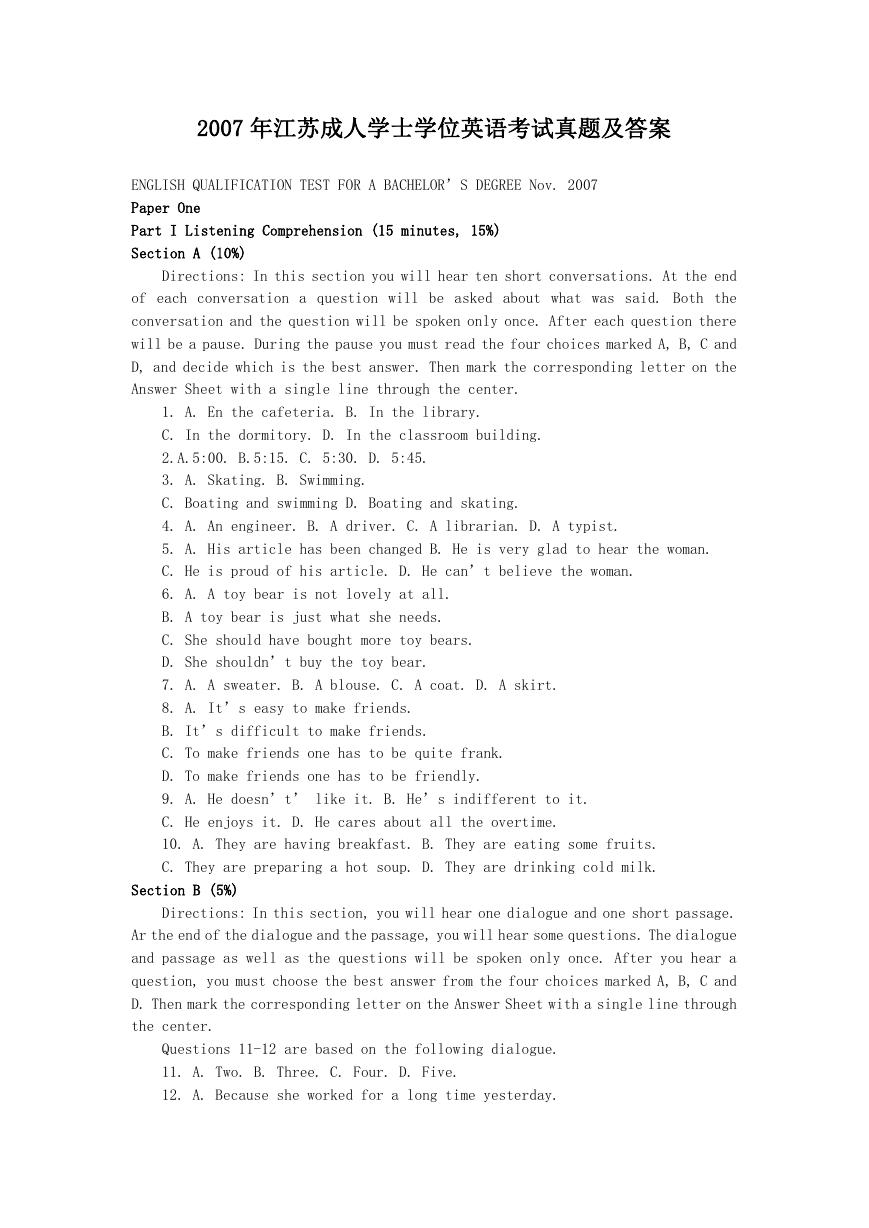
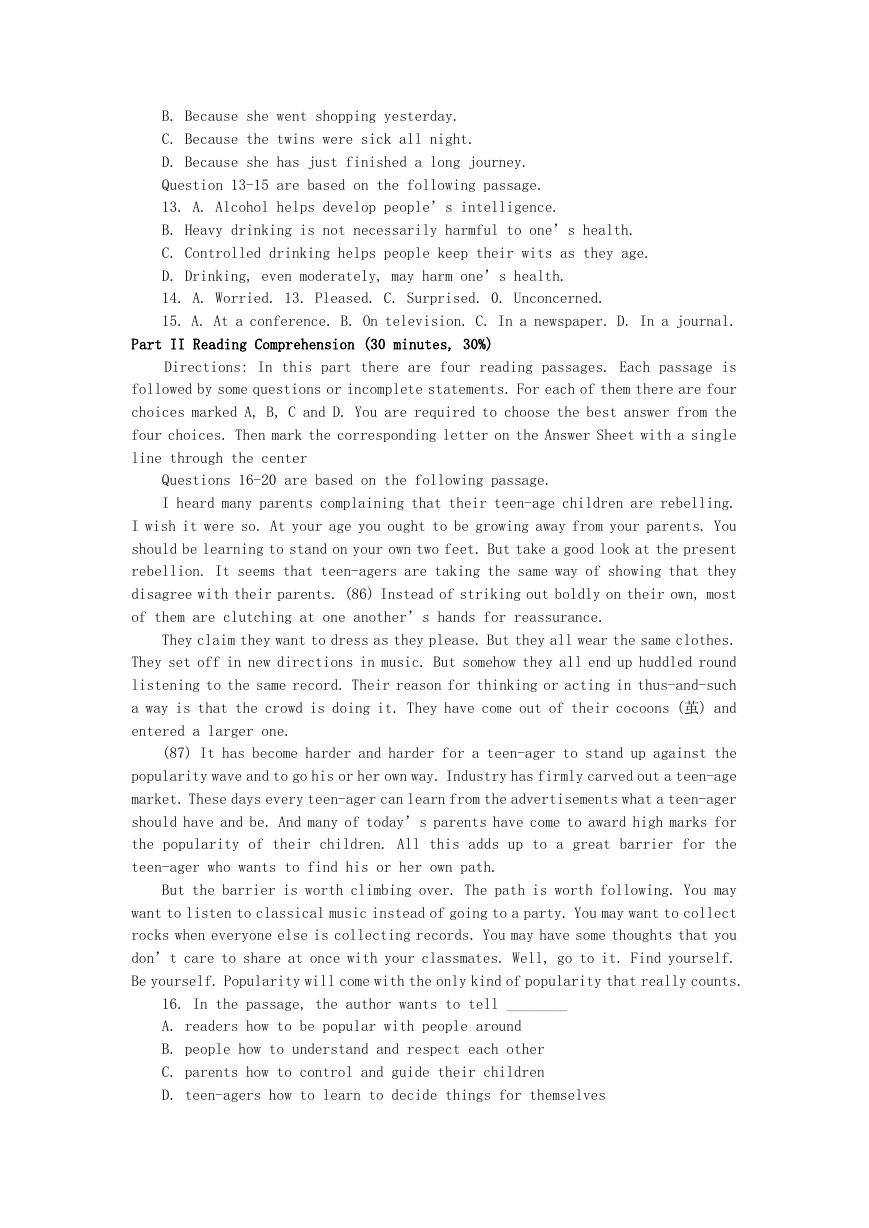
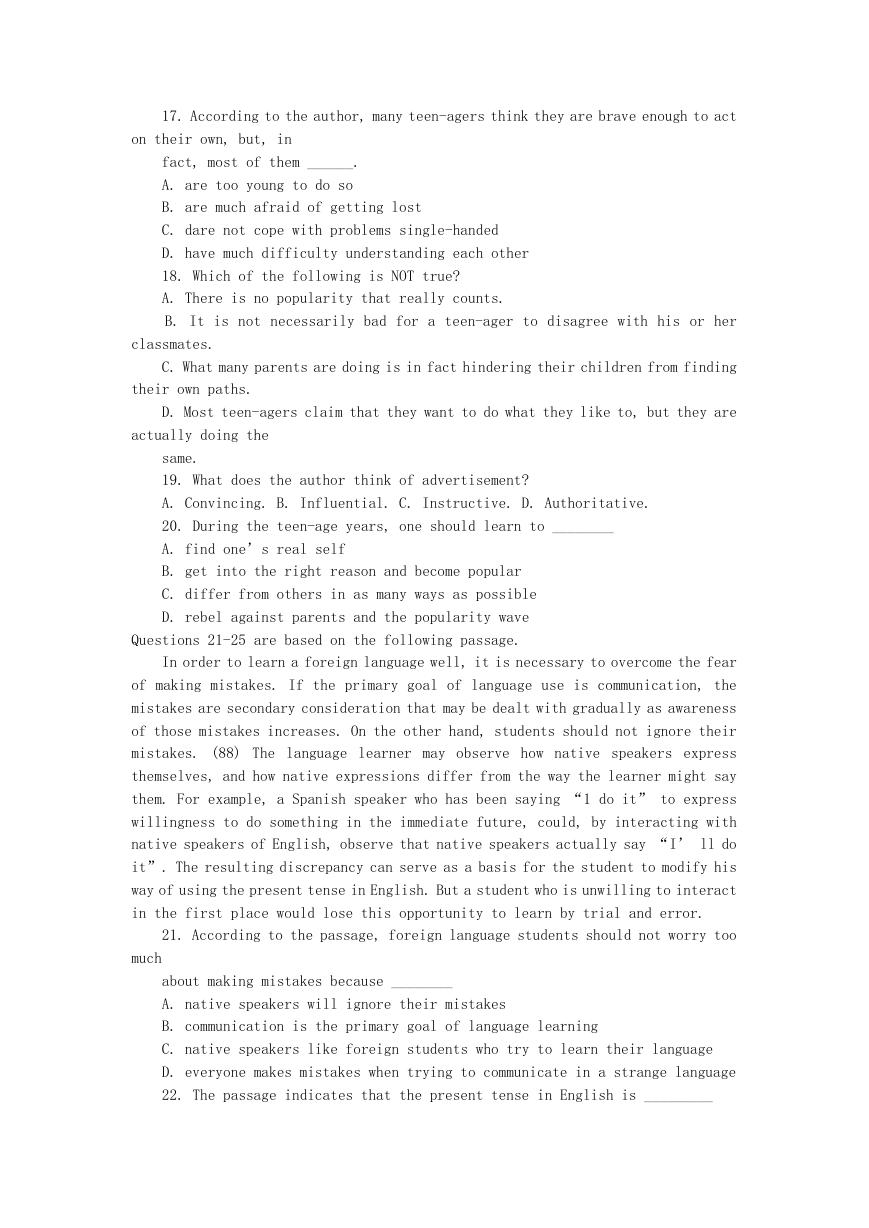
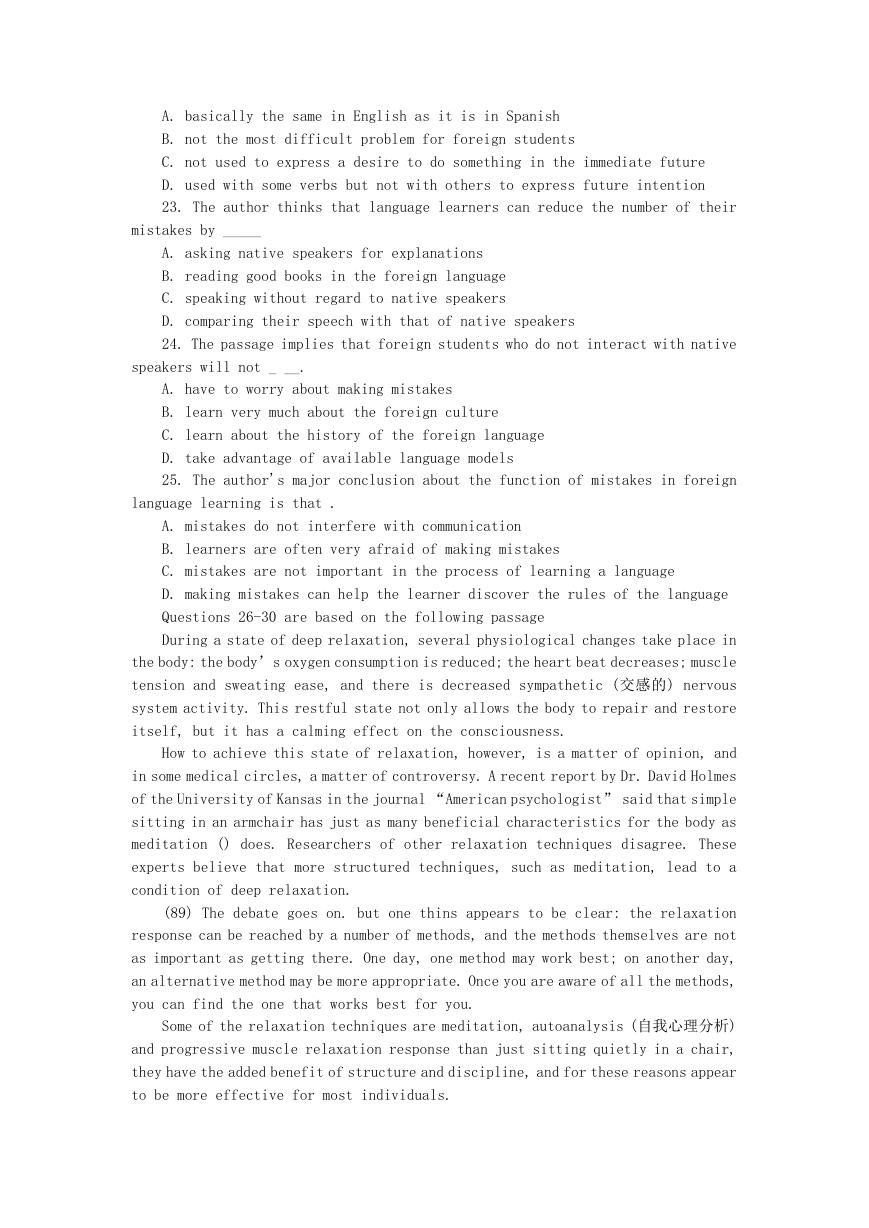

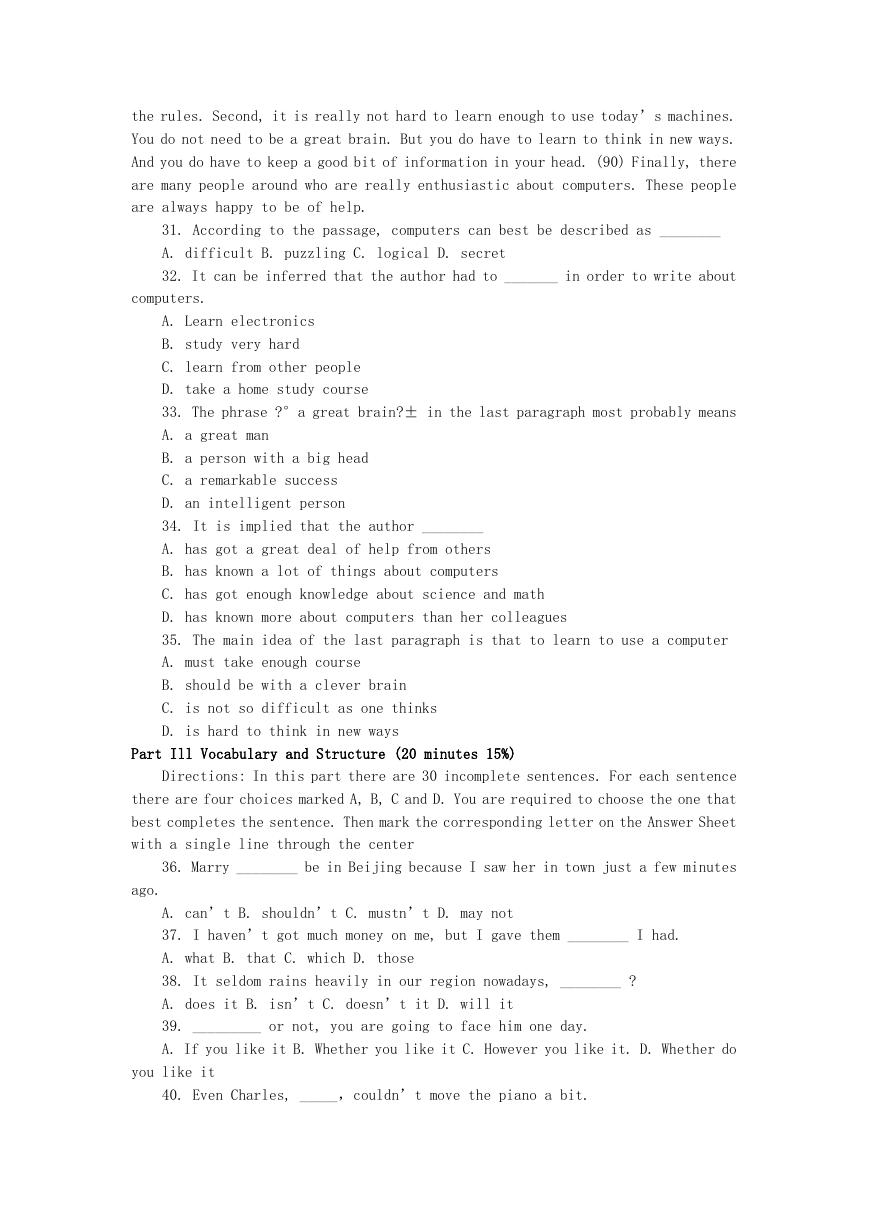

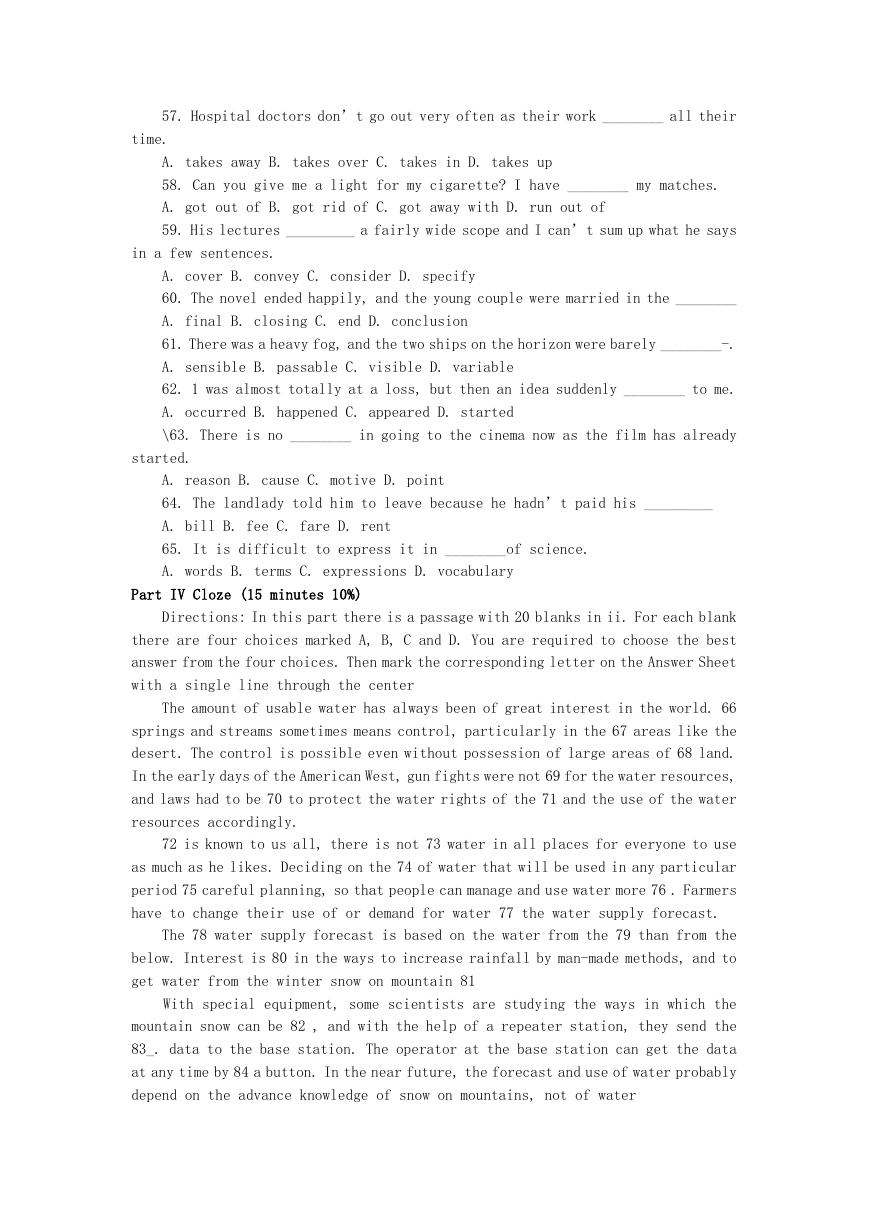








 2023年江西萍乡中考道德与法治真题及答案.doc
2023年江西萍乡中考道德与法治真题及答案.doc 2012年重庆南川中考生物真题及答案.doc
2012年重庆南川中考生物真题及答案.doc 2013年江西师范大学地理学综合及文艺理论基础考研真题.doc
2013年江西师范大学地理学综合及文艺理论基础考研真题.doc 2020年四川甘孜小升初语文真题及答案I卷.doc
2020年四川甘孜小升初语文真题及答案I卷.doc 2020年注册岩土工程师专业基础考试真题及答案.doc
2020年注册岩土工程师专业基础考试真题及答案.doc 2023-2024学年福建省厦门市九年级上学期数学月考试题及答案.doc
2023-2024学年福建省厦门市九年级上学期数学月考试题及答案.doc 2021-2022学年辽宁省沈阳市大东区九年级上学期语文期末试题及答案.doc
2021-2022学年辽宁省沈阳市大东区九年级上学期语文期末试题及答案.doc 2022-2023学年北京东城区初三第一学期物理期末试卷及答案.doc
2022-2023学年北京东城区初三第一学期物理期末试卷及答案.doc 2018上半年江西教师资格初中地理学科知识与教学能力真题及答案.doc
2018上半年江西教师资格初中地理学科知识与教学能力真题及答案.doc 2012年河北国家公务员申论考试真题及答案-省级.doc
2012年河北国家公务员申论考试真题及答案-省级.doc 2020-2021学年江苏省扬州市江都区邵樊片九年级上学期数学第一次质量检测试题及答案.doc
2020-2021学年江苏省扬州市江都区邵樊片九年级上学期数学第一次质量检测试题及答案.doc 2022下半年黑龙江教师资格证中学综合素质真题及答案.doc
2022下半年黑龙江教师资格证中学综合素质真题及答案.doc